Are you wondering when to stop washing your tattoo? This definitive guide will provide you with all the information you need to know about how to properly care for your tattoo. From the initial healing process to safeguarding your artwork for years to come, this guide will tell you everything you need to know about when to stop washing your tattoo. We’ll also provide you with advice on when to start washing your tattoo, as well as tips on which products to use and how to prevent infection. With this guide, you’ll be able to enjoy your tattoo for years to come.
Contents
What Happens During the Tattoo Process
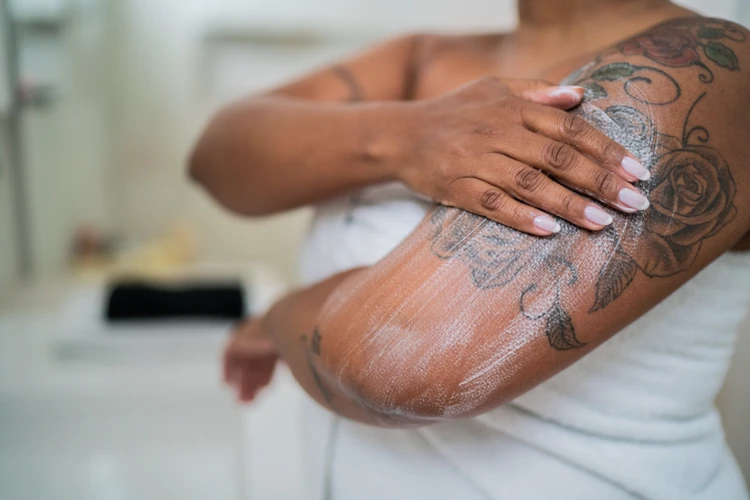
Tattoo Process Overview
The tattoo process begins with the artist drawing the design on the skin. After the design is finalized, the artist will begin the tattooing process by using a needle to inject tiny amounts of pigment into the skin. This process will cause some minor bleeding and discomfort.
Aftercare Instructions
Once the tattoo is complete, the artist will provide you with aftercare instructions. These instructions usually include washing the tattoo with a mild soap and lukewarm water, as well as applying a thin layer of ointment. This process should be done several times a day for a few days in order to keep the area clean and promote healing. After a couple of days of following these instructions, you may be wondering when can you stop washing a new tattoo.
The Healing Process
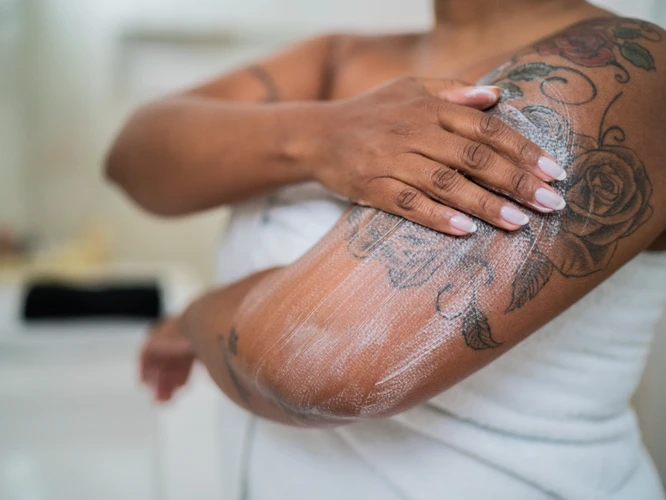
Getting a new tattoo is an exciting step in expressing yourself, but it’s important to understand the proper care and healing process to ensure the best results. Properly caring for your tattoo will help ensure it looks its best in the long run.
What to Expect
During the healing process, your tattoo will go through several stages. Immediately after getting your tattoo, you’ll likely experience slight swelling and tenderness. You may also experience some minor bleeding, which is normal. In the first three or four days, your tattoo will begin to scab and may start to itch. Avoid scratching since this can cause damage to the skin.
Duration of Healing
The healing process for a tattoo can take anywhere from two weeks to several months, depending on the size and location of the tattoo. During this time, it’s important to keep the area clean and moisturized. Avoid submerging the tattoo in water, such as swimming or soaking in a bathtub. After the initial healing phase, your tattoo may still require some additional care and protection.
How to Stop Washing Your Tattoo
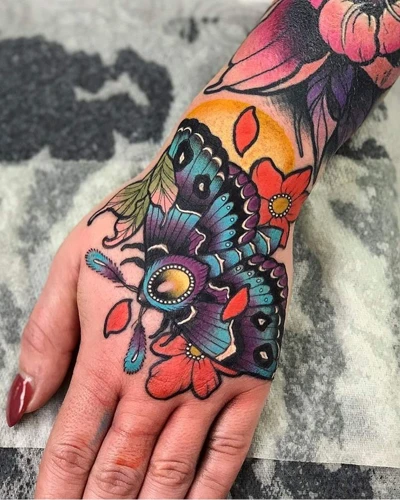
Washing Tattoo
Properly caring for a new tattoo is essential for ensuring it heals correctly and looks its best. It is important to keep the tattoo clean and to wash it regularly while it is healing. However, at some point you need to know when it is time to stop washing your tattoo.
Stopping Washing
When your tattoo is healing, it is important to wash it with lukewarm water and a mild, fragrance-free soap at least twice a day. This helps to keep the area free of bacteria and other debris that can cause infection or irritation. Once the tattoo has healed, usually after two to four weeks, you should stop washing the area with soap. Instead, use a mild moisturizer to keep the skin hydrated and to help protect the tattoo from fading. Avoid scrubbing the area as this can cause irritation and damage the tattoo.
Potential Problems When Stopping Washing
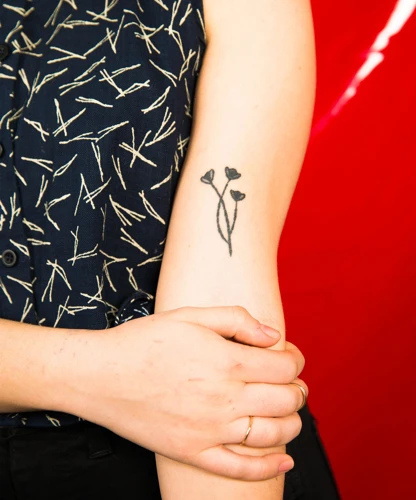
Infection
Infection is one of the biggest risks when it comes to proper aftercare for a tattoo. If the tattoo is not properly washed and cared for, bacteria and other contaminants can get into the skin and cause infection. If the infection is not treated quickly, it can lead to more severe issues, such as abscesses, scarring, and even permanent damage to the tattoo.
Allergic Reactions
Allergic reactions can also be a problem when it comes to tattoos. Some people may have a sensitivity or allergy to the ink or the tattooing process, and this can cause an allergic reaction. This reaction can be anything from mild skin irritation to a more serious reaction, such as hives or anaphylactic shock. If any of these reactions occur, it is important to seek medical attention immediately.
Treatment for Problems After Stopping Washing
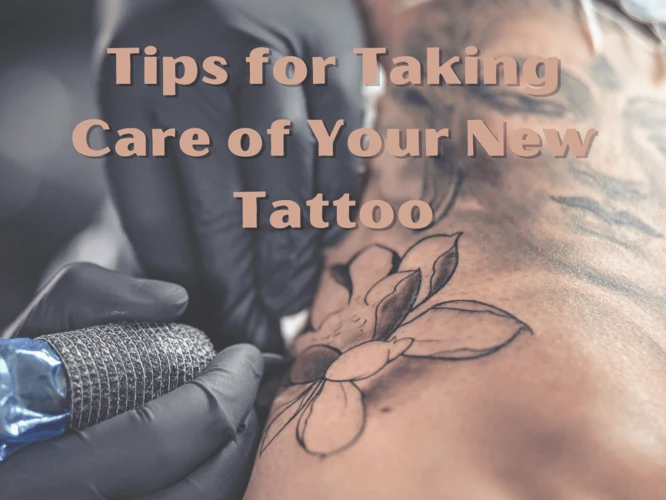
If you have experienced problems after stopping washing your tattoo, there are a few treatments you can try.
Moisturizing the Tattoo – Keeping your tattoo well-moisturized is key to maintaining its vibrant colors. Use a gentle, fragrance-free moisturizer to keep the skin around your tattoo hydrated and prevent it from drying out.
Applying Antibacterial Cream – If you are experiencing redness, irritation, or excessive itching, you may want to apply an antibacterial cream to the affected area. This will help reduce inflammation and prevent infection.
Seeking Medical Attention – If you are experiencing severe pain or discomfort, you should seek medical attention immediately. Your doctor may recommend additional treatments, such as antibiotics or steroid creams.
Prevention of Problems After Stopping Washing
Proper Care
It is essential to maintain proper care of your tattoo after you stop washing it. Be sure to keep your tattoo clean and free of dirt and debris by gently wiping it with a clean, damp cloth. Avoid scrubbing or using harsh cleansers, as this can irritate the skin and cause infection. Also, avoid soaking the tattoo in water for long periods of time or exposing it to direct sunlight.
Moisturizing
Once you have stopped washing your tattoo, it is important to keep it moisturized. This will help to keep the skin supple and prevent it from cracking and drying out. There are a variety of moisturizers available, including lotions, creams, and oils. Choose one that is specifically designed for tattoos, as they are formulated to be gentle on the skin and protect the ink. Be sure to apply the moisturizer regularly and as needed.
Frequently Asked Questions
How Long Should I Wait to Start Washing My New Tattoo?
It is recommended to wait at least 24 hours before washing your new tattoo. During the healing process, it is important to keep the tattoo clean and free from dirt and germs. To do this, gently cleanse the area with a mild, fragrance-free soap and lukewarm water. Pat the area dry with a clean, soft towel. Do not rub the area, as this can cause irritation. After the area is dry, apply a thin layer of a fragrance-free lotion or ointment to keep the skin moisturized. Avoid swimming, soaking in hot tubs, and other activities that can expose your tattoo to germs or other pollutants.
What Kind of Soap Should I Use to Clean My Tattoo?
Tattoo-specific soap: This soap is specifically formulated for tattoo aftercare and will help to keep your tattoo clean and protect it from infection.
Glycerin-based soap: This type of soap is gentle on the skin and is a great choice for those with sensitive skin. It helps to keep moisture in the skin and will help to keep your tattoo looking fresh.
Antibacterial soap: This type of soap is designed to kill any bacteria on the skin, which is important when it comes to keeping your tattoo clean and infection-free.
Fragrance-free soap: Fragrance-free soap is a great choice for those with sensitive skin, as it is less likely to cause irritation. It is also a good choice for those looking to keep their tattoo looking as fresh and vibrant as possible.
Is it Necessary to Use a Special Type of Moisturizer for My Tattoo?
No, it is not necessary to use a special type of moisturizer for your tattoo. However, it is important to keep your tattoo moisturized and protected from the sun. A gentle, unscented moisturizer with SPF can help keep your tattoo looking its best. Avoid using fragranced lotions or moisturizers with harsh chemicals, as these can damage your tattoo. Additionally, avoid soaking your tattoo or scrubbing it too hard.
How Often Should I Be Washing My Tattoo?
During the first two weeks, your tattoo should be washed twice a day with warm water and a mild, fragrance-free soap. After that, you can reduce washing to once a day, or even every other day. Avoid using hot water, scrubbing your tattoo, or using any harsh soaps or exfoliators.
Are There Any Risks Associated With Over-Washing a Tattoo?
Yes. Over-washing a tattoo can lead to a number of risks, including:
- Irritation and dryness
- Infection
- Scarring
- Fading or discoloration
Irritation and dryness can occur when a tattoo is washed too often, as the soap and water can strip away the natural oils in the skin. This can lead to uncomfortable itching and flaking.
Infection can also occur if a tattoo is exposed to too much water or soap. It is important to keep the area clean and dry, as this will help to reduce the risk of infection.
Scarring can occur if a tattoo is washed too vigorously. This is because the skin may become too dry and can crack, which can lead to scarring.
Fading or discoloration can occur if a tattoo is exposed to too much soap or water. This is because the colors can be stripped away, leaving the tattoo with a dulled or faded appearance.
It is important to follow the aftercare instructions provided by your tattoo artist and not to wash your tattoo too often. This will help to ensure that your tattoo heals properly and looks its best.
Conclusion
Tattoo aftercare is essential. Washing your tattoo correctly is important to prevent infection and ensure that it heals properly. After washing, it is important to use a moisturizer and protect the tattoo from the sun and other environmental elements. To ensure that your tattoo heals properly, always follow the instructions of your tattoo artist and ask any questions you may have about the healing process.